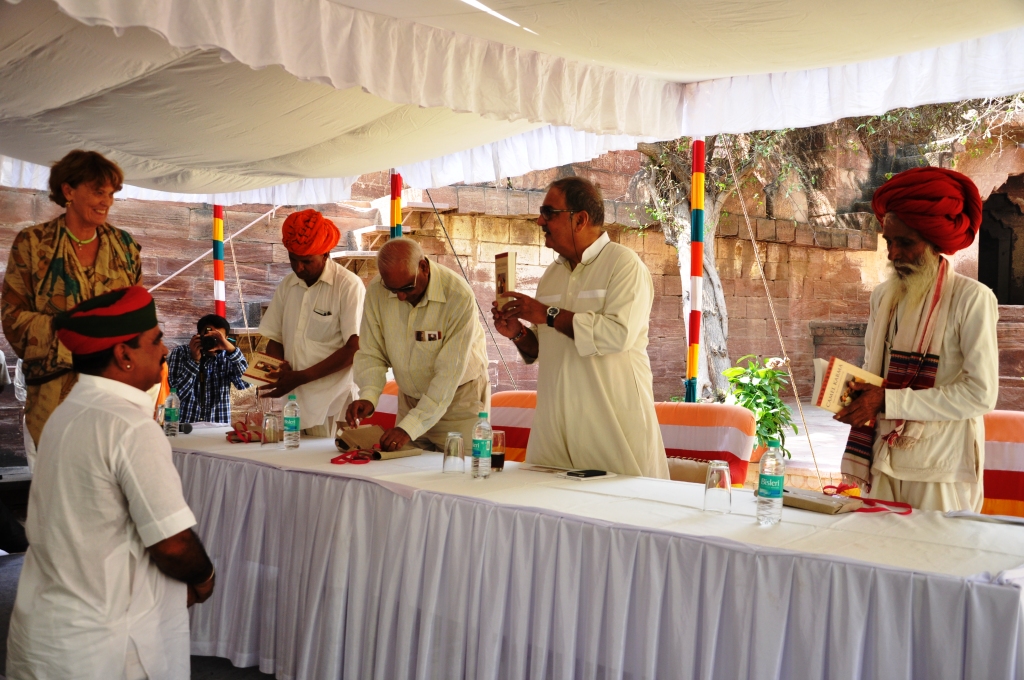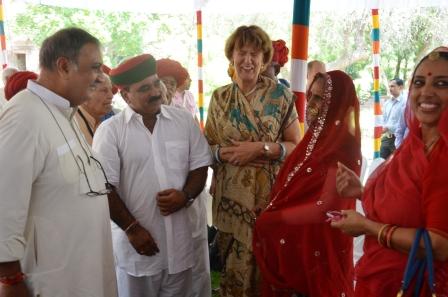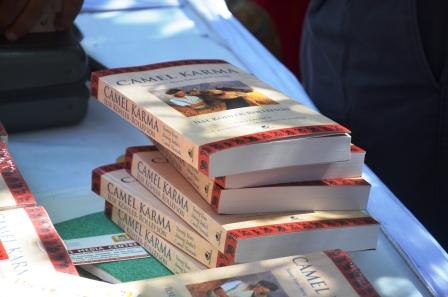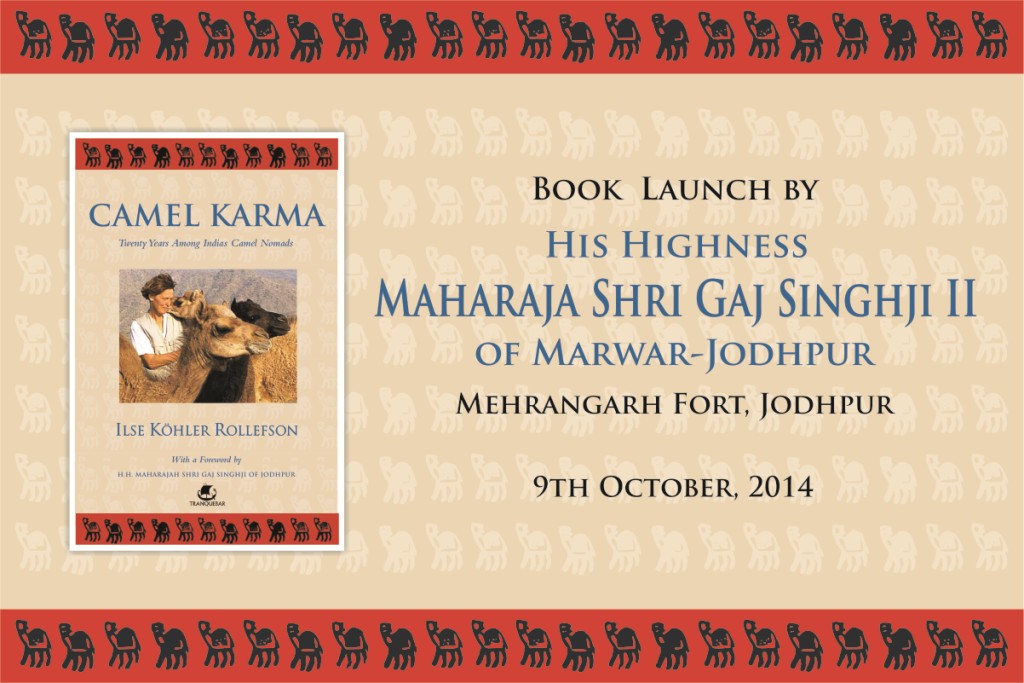I am very excited to participate in the Jaipur Literature Festival 2018 and be talking about Camel Karma with Paro Anand and Prerna Bindra on the opening day, 25th January from 11.15 to 12.15 in Samvad at Diggi Palace. Entrance to the "Greatest Literary Show on Earth" is free, so please join us to learn the latest about the precarious state of Rajasthan's state animal and about the magic of camel milk!
Marwar Camel Culture Festival 3-5 November, 2017
The second edition of the Marwar Camel Culture Festival will be celebrated from 3-5th November on the campus ofLokhit Pashu-Palak Sansthan near Ranakpur from 3-5 November. An exciting programme is in the offing, the core constituency being camel breeders from all over Rajasthan discussing about the future of the camel in Rajasthan. Much emphasis will be on camel milk and how to make this wondeful substance more accessible to consumers. There will be many fun events, including a full moon concert of camel songs and culinary delicacies provided by master cheese makers Anne Bruntse and Robert Paget. Come and join us!
Dinner among camels and Camel Charisma guesthouse
Camels are fascinating animals, but they need more friends and people who understand them. The Raika and their intriguing culture are under a lot of pressure, despite their camels being state animal. To increase understanding of the camels, the Raika and their situation, Camel Charisma and LPPS, the two organisations I am associated with, will now offer various opportunities for visitors to interact with camels and their keepers. You can have dinner among a camel herd and you can stay on the LPPS campus, you could even "be a Raika" for a day (or longer) by helping herding and taking care of camels. Please write to us at lpps.sadri1996@gmail.com if you are interested - these arrangements have to be booked in advance!
The Marwar Camel Culture Festival
LPPS will be holding the Marwar Camel Culture Festival from 6-8th November at Ranakpur-Sadri in Rajasthan. So mark your calendar to not miss this vibrant event that will feature events, exhibitions, food and debate around the camel! It will be just after the Pushkar Camel Fair and centre around the products of the living camel. More information will come forward soon, but definitely there will be a Camel Cheese Tasting!
These truly gentle giants help sheep nomads to move their households
Not without camels.....
Recently I returned from an extended visit to Raika sheep nomads who were on their annual migration to Southern Rajasthan and Madhya Pradesh. These groups use mostly camels to transport all their belongings, including beds, small children and lambs. The loading and unloading is the women's duty, although the men also pitch in. It was marvellous to see how the camels cooperate and even collaborate. They patiently sit down to be packed and can be led by the smallest children.
This surely is a very ecological way of transportation, but unfortunately the legislation by the Government of Rajasthan that is in the pipeline to "save the camel" will make life so much more difficult for the nomads: once it comes into effect the nomads will require an official permit if they take camels across state borders.
Read MoreReading at Camp Bliss in Pushkar Camel Fair
I'll be reading from "Camel Karma" on 26th October and 1st November during a Dinner event hosted by Camp Bliss at Pushkar Fair. More information at http://www.pushkarcamelfair.com/events-programme-wild-books/
Looking forward to meeting you there and answering any questions you might have about camels and their keepers!
Camels from Jojawar departing for Pushkar on 21st October. It will take them 7 days to reach. Many of them are being sent there for the third time, as they could find no buyers in previous years.
The last trek to Pushkar?
The mood is not good among the camel breeders in our area. Practically all of them are trying to sell their herds of female camels, as they have only expenses and no income from them. The talk about the Rajasthan Camel Bill, 2014 is not helping the matter and seems to be increasing the speed with which the Raika are trying to divest themselves of their herds. En route to Jojawar yesterday, we met a herder with nice healthy females that he was intending to sell at Pushkar (when I started my research in 1990/91, there was still a total taboo on selling female camels which was punished by "outcasting"). It breaks one's heart and one wants to buy them all, but that would be a drop in the ocean. What is really needed is a systematic effort of identifying and saving Rajasthan's best camel genetic resources as foundation for developing a dairy industry.
The Raika of Jojawar may be going to Pushkar for the last time, as most of them have not managed to sell any camels there for the last three years. We hear even worse stories from the Mewar area of Rajasthan where - so we were told - entire herds are bundled up and then lifted by means of a JCB into trucks that take them to slaughter houses.
Camels of Rajasthan: new website launched by LPPS
The Pushkar Fair is coming up soon; camel breeders will start arriving about a week from now, around 25th October. Many of our Raika friends are still uncertain whether they will take the trouble to go - actually they have been asking us to take their camels along, because they fear it may not be worth their time and effort due to the planned legislation stopping movement of camels across Rajasthan's borders. A new website has been launched by LPPS that calls for a different approach to saving Rajasthan's camels. Please have a look at www.camelsofrajasthan.com and also follow us on twitter @camelsrajasthan.
What a launch!
Camel Karma's launch was simply wonderful! The setting in the fragrant Chokelao Bagh garden against the backdrop of the truly majestic Mehrangarh Fort. One of my favourite camel related songs "Gorbandh" played by Manganiyar musicians. My long-term Raika friends including internationally famous pastoralist activist, Dailibai. Staff and interns of LPPS in attendance. The book wrapped in camel poo paper.....
Unwrapping the book from its camel poo paper packaging!
From left to right: Ilse, Hanwant Singh, Dr. Dewaram Dewasi, Col. Dr. Umaid Singh, His Highness, and Shree Babulal Raika.
Most of all the wise words and kind support of His Highness Maharaja Shri Gaj Singhji II of Marwar-Jodhpur who noted the instrumental role of the Rathore Rajputs in the history of the camel in Rajasthan and called for a new approach to saving it.
“If we want to save the camel, it has to once again become relevant to the people of Rajasthan.”
Before his vote of thanks, Hanwant Singhji, presented His Highness with an assortment of camel products - stoles, dhurries, soaps and poo paper items - which met with much appreciation. Later there was some light-hearted banter between all of the launch guests.
Then, while I was signing books, the Raika engaged in photo sessions and made friends with Thakurani Jyotika Kumari Diggi, the host of the Jaipur Lit Festival
A memorable event by all standards, and we just hope that Camel Karma will help to highlight both camels and the unique Raika culture they are associated with!
Preparations for the launch
I am immensely honoured that Camel Karma will be launched by H.H. Maharaja Shri Gaj Singhi II in Mehrangarh Fort during the Rajasthan International Folk Festival on 9th October at 12 pm. Details will follow!
Our camel herder Manaram Raika
For the last twenty years, we have been doing all we can think of to save Rajasthan's unique and wonderful camel culture. But mostly it was a bit "hands off", in so far as we did not actually manage and look after our own camels on a daily basis. Instead the offspring of "Mira", the first camel I bought in 1991 at Pushkar fair, was taken care of by Raika herders from Jojawar, Latada and other villages.
But in 2013, the situation changed. When our three young male camels did not sell at Pushkar (or would only have sold for meat), we decided to bring them home. After all we had a camel enclosure ready in Butibagh that had not been inhabited since the camels that had accompanied us on our camel yatra had left us to become stud camels. And we also had just adopted an orphaned camel girl, Moomal, from Jaisalmer, who really needed some company.
So there we were, finally having a small camel herd in our own backyard, so to speak. It was a lovely feeling, but with all our other commitments, it became pretty clear that we still needed to have somebody looking after them and taking them out for a daily browse. So started the search for a Raika, who still had the skill and inclination to herd camels.
With the help of our friends, we were fortunate to find Manaram Raika, who is not just a camel man, but also has experience herding buffaloes (more lucrative than herding camels) and has travelled on long-distance sheep migration to Madhya Pradesh.









